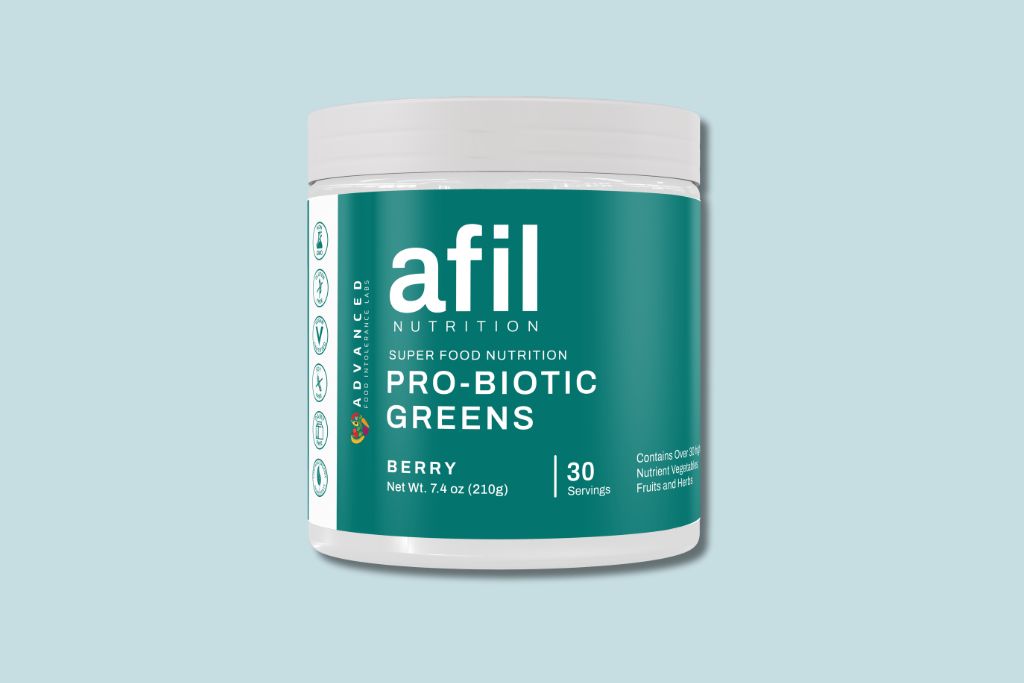In an era where gut health is increasingly recognized for its critical role in overall wellness, probiotics have surged in popularity as essential allies in our quest for a healthy life. Traditionally, these beneficial bacteria have been sourced from dairy products and supplements, aimed at enhancing the diversity and function of our gut microbiome.
However, a new trend is emerging on the horizon of nutritional science: green probiotics. These plant-based probiotics not only promise to support our digestive health but also align with environmentally friendly and sustainable practices.

This article looks into green probiotics, shedding light on their natural ingredients and exploring what makes them an effective choice for those seeking to bolster their health in harmony with the planet.
What Are Green Probiotics?
Green probiotics represent a novel and exciting shift in the world of dietary supplements, rooted in the principle of harnessing nature's bounty for our gut health. Unlike traditional probiotics, which often derive from dairy sources or laboratory-cultivated strains, green probiotics are sourced exclusively from plant-based origins. These include fermented fruits and vegetables, as well as other botanical ingredients, offering a natural and vegan-friendly alternative to conventional probiotics.
The distinction between green and traditional probiotics lies not just in their sources but in their production and consumption's ecological footprint. Green probiotics emphasize sustainability, leveraging the natural process of fermentation which not only produces beneficial bacteria but also minimizes waste and resource use. This approach aligns with growing consumer demand for products that support personal health without compromising the health of our planet.
But what exactly makes these probiotics "green"? It's their reliance on plant-based ingredients, minimal processing, and often, organic farming practices that reduce the use of synthetic pesticides and fertilizers. This holistic perspective extends beyond the probiotic itself to consider the entire lifecycle of the product, from seed to shelf. By choosing green probiotics, consumers contribute to a more sustainable food system that respects the earth and its resources.
Green probiotics are more than just a health supplement; they are a choice that reflects a commitment to environmental stewardship and a healthier lifestyle. As we delve deeper into their benefits and the science behind them, it becomes clear that green probiotics are not just good for us—they're also good for the planet.
Key Ingredients in Green Probiotics

Green probiotics are a unique blend of microorganisms that not only benefit our health but also align with a more sustainable and natural lifestyle. The foundation of green probiotics lies in their plant-derived ingredients, offering a symbiotic relationship between our bodies and nature. Here, we delve into the common ingredients that make green probiotics a powerhouse for gut health and beyond.
Plant-Derived Probiotic Strains: Unlike traditional probiotics that often source strains from dairy or other animal-based products, green probiotics utilize strains originating from plant materials. Among these, Lactobacillus plantarum and Bifidobacterium lactis are prominent. Lactobacillus plantarum is known for its ability to enhance the intestinal barrier, improve digestion, and boost the immune system. Bifidobacterium lactis, on the other hand, plays a crucial role in digesting dietary fibers, promoting bowel regularity, and preventing the growth of harmful bacteria.
Prebiotics: Essential to the effectiveness of green probiotics are prebiotics, the non-digestible fibers that serve as food for probiotics. By including prebiotics, green probiotics ensure a nourishing environment for the probiotics to thrive in the gut. A common source in green probiotics is inulin, derived from chicory root, known for its ability to support gut health by increasing the proliferation of beneficial bacteria.
Fermented Plant Extracts: Many green probiotics also incorporate fermented plant extracts from foods like kimchi, sauerkraut, and miso. These foods naturally contain beneficial bacteria and enzymes that enhance the probiotic profile and contribute to diverse gut microbiota. The fermentation process also increases the bioavailability of nutrients, making these ingredients a potent addition to green probiotics.
Health Benefits of Green Probiotics
The ingredients in green probiotics are not just a nod to sustainability and natural living but offer profound health benefits. By harnessing the power of plant-derived probiotics and prebiotics, green probiotics can significantly impact our well-being.
- Gut Health: The primary benefit of green probiotics is the improvement of gut health. By balancing the gut microbiota, these probiotics aid in digestion, prevent constipation, and can alleviate symptoms of irritable bowel syndrome (IBS). The presence of specific strains like Lactobacillus plantarum helps strengthen the gut barrier, reducing the risk of infection and inflammation.
- Immune System Support: A healthy gut is a cornerstone of a robust immune system. Green probiotics play an essential role in educating and modulating the immune system, making it more efficient in fighting off pathogens. The direct interaction between probiotic strains and the gut's immune cells primes the immune response, ensuring a swift and effective defense against illnesses.
- Sustainability: Beyond individual health benefits, green probiotics contribute to a larger cause - environmental sustainability. By choosing plant-based sources, these probiotics support agricultural practices that are less resource-intensive and more harmonious with the ecosystem. This not only reduces the carbon footprint but also promotes biodiversity and soil health.
In conclusion, the carefully selected ingredients in green probiotics offer a holistic approach to health that benefits both the individual and the planet. By improving gut health, supporting the immune system, and contributing to sustainability, green probiotics represent a forward-thinking choice in the realm of dietary supplements.
Effectiveness of Green Probiotics
The burgeoning interest in green probiotics stems from their unique position at the intersection of health and sustainability. As consumers become increasingly mindful of not only their own health but also the health of the planet, green probiotics offer a compelling proposition. However, understanding their effectiveness involves delving into scientific evidence, comparing them to traditional probiotics, and considering various factors that influence their impact.
Scientific Evidence Supporting Health Benefits

Recent studies have started to shed light on the specific benefits associated with green probiotics. For instance, certain strains found in plant-based sources, such as Lactobacillus plantarum and Bifidobacterium lactis, have been shown to improve gut health by enhancing the intestinal barrier, reducing inflammation, and fighting off harmful bacteria.
This, in turn, can contribute to a stronger immune system, as a significant portion of the body’s immune response is linked to the gut. Moreover, the environmental benefits of green probiotics, such as reduced carbon footprint and sustainable sourcing, add an extra layer of appeal for eco-conscious consumers.
Comparison With Traditional Probiotics
While traditional probiotics, typically derived from dairy products, have been the go-to option for enhancing gut health for years, green probiotics present a viable alternative for those looking for plant-based options. One question that often arises is whether green probiotics are more effective or beneficial than their traditional counterparts. The answer is not straightforward, as the effectiveness can vary based on individual health conditions, dietary preferences, and environmental concerns. However, for individuals who are lactose intolerant, vegan, or environmentally conscious, green probiotics may offer a preferable and effective option.
Factors Influencing Effectiveness
The effectiveness of green probiotics can be influenced by several factors, including:
- Strain Specificity: The health benefits of probiotics are often strain-specific. Thus, it's important to choose a supplement or food source that contains the specific strains known to provide the desired health benefits.
- Dosage: The amount of CFUs (colony-forming units) can affect the probiotic's impact. A higher CFU count doesn't always mean better; the optimal dose depends on the specific strain and the individual's health needs.
- Individual Gut Microbiome: Everyone's gut microbiome is unique, and the same probiotic can have different effects on different people. Personal health history and current gut health play a significant role in how effectively a probiotic works.
Choosing the Right Green Probiotics

With the growing market for green probiotics, selecting the right product can be overwhelming. Here are some considerations to help make an informed choice:
Considerations for Selecting High-Quality Green Probiotics
- CFU Count and Strain Diversity: Look for products that specify the CFU count at the time of consumption and offer a diversity of strains to target different health benefits.
- Source Transparency: Opt for brands that are transparent about their sources and use sustainably sourced, non-GMO ingredients.
- Certifications: Certifications like USDA Organic or Non-GMO Project Verified can be indicators of quality and sustainability.
Tips for Incorporating Green Probiotics Into a Healthy Lifestyle
Incorporating green probiotics into your diet goes beyond just taking a supplement. Consider these tips for a holistic approach:
- Dietary Recommendations: Include a variety of fermented plant-based foods in your diet, such as kimchi, sauerkraut, and kombucha, to complement your probiotic intake.
- Lifestyle Considerations: Maintain a balanced diet rich in fiber, stay hydrated, and ensure adequate sleep and exercise, as these factors all contribute to gut health.
Frequently Asked Questions
What are green probiotics?
Green probiotics are a category of probiotics that are derived from plant-based sources, emphasizing environmentally friendly and sustainable practices. Unlike traditional probiotics, which may come from dairy or other animal sources, green probiotics focus on harnessing the beneficial bacteria found in plants or are produced in ways that have a lower environmental impact.
How do green probiotics differ from regular probiotics?
The main difference lies in their source and environmental impact. Green probiotics are sourced from plants and are designed to be more sustainable, while regular probiotics can come from a variety of sources, including dairy products. Both types aim to improve gut health, but green probiotics also consider the ecological footprint of their production.
Can green probiotics help with digestion?

Yes, like other forms of probiotics, green probiotics can help improve digestion. They contribute to a balanced gut microbiome, aiding in the breakdown of food, enhancing nutrient absorption, and potentially reducing symptoms of digestive discomfort such as bloating and irregular bowel movements.
Are green probiotics suitable for vegans?
Yes, green probiotics are an excellent choice for vegans, as they are derived from plant-based sources. This makes them compatible with a vegan lifestyle, offering a way to incorporate beneficial probiotics without relying on animal-derived products.
How do I choose the right green probiotic supplement?
When selecting a green probiotic supplement, consider factors such as the variety and strains of bacteria, the colony-forming units (CFU) count, and the product's source and manufacturing practices. Look for products with transparent labeling and evidence of third-party testing to ensure quality and efficacy. Additionally, consulting with a healthcare provider can help determine the best probiotic for your specific health needs and dietary preferences.
Conclusion
As we wrap up our exploration of green probiotics, it's clear that these plant-based supplements offer a promising avenue for enhancing gut health in a manner that's not only effective but also aligns with a more sustainable and environmentally friendly approach to wellness. Throughout this article, we've delved into the nature of green probiotics, the key ingredients that make them stand out, and the numerous health benefits they can offer, from improving digestion and boosting the immune system to their potential impact on the environment.
Green probiotics represent an intersection of health and sustainability, encouraging us to reconsider not just what we consume, but also how our choices affect the world around us. By choosing plant-based probiotics, we're not only taking a step towards better health but also contributing to a more sustainable future. However, as with any supplement, it's crucial to select high-quality products and consult with a healthcare provider to ensure they're a suitable addition to your wellness routine.
The journey towards better health is personal and multifaceted, involving diet, exercise, and the careful selection of supplements that support your body's needs. In this context, green probiotics can be a valuable component of a holistic approach to health, offering benefits that extend beyond the individual to the planet as a whole.
As research into probiotics continues to evolve, it's exciting to consider what the future holds for green probiotics. With ongoing studies and advancements, we may see even more innovative and effective ways to harness the power of plant-based probiotics. For now, green probiotics stand as a testament to the potential of combining health, innovation, and sustainability into a single, impactful choice.
In embracing green probiotics, we're not just nurturing our own health; we're also making a choice that reflects our commitment to the planet's wellbeing. It's a step towards a future where health supplements and environmental sustainability go hand in hand, offering a blueprint for how we might approach other aspects of wellness and lifestyle. As we move forward, let's keep an open mind to the possibilities that lie at the crossroads of health and sustainability, and consider how choices like green probiotics can contribute to a healthier, greener world.


.png?v=1737390083)
.png?v=1737187409)


